2019年高考英语试题全国卷及答案
2019年高考英语试题(全国Ⅰ卷)答案

2019年全国普通高等学校招生统一考试(全国Ⅰ卷)英语答案答案速查:第一部分听力1–5 BABCA 6–10 CBACC 11–15 BACAB 16–20 ACBAC第二部分阅读理解21–25 BDDBA 26–30 ACDCB 31–35 DCABA 36–40 EAGCD第三部分语言知识运用41–45 DCCBA 46–50 CDCAB 51–55 DABDA 56–60 CBDAB61.that 62.poorly 63.of/for 64.to perform 65.have reported 66.belief 67.noting 68.higher 69.the 70.are第二部分阅读理解第一节A体裁:应用文题材:广告主题:兼职活动【文章大意】本文介绍了学生在暑期可以兼职的四个项目。
21.B【解析】根据Summer Company中的“Summer Company provides students with hands-on business training and awards of up to $3,000 to start and run their own summer businesses”可知,这个项目给创业的学生提供高达三千美元的奖金。
Summer Company并没有提到在工作前不需要培训,故可排除A项;Summer Company没有提到工作环境,因此可排除C项;对比四个项目可知,这四个项目都是关于暑期工作的信息,Summer Company并没有提供更多的工作信息,因此可排除D项。
22.D【解析】本题问Stewardship Youth Ranger Program要求的参与活动的学生的年龄范围。
根据本部分中的“Who is eligible:Students aged 16 or 17 at time of hire, but not turning18 before December 31 this year”可知,学生的年龄应该在16–17岁,故选D。
2019年高考英语真题卷(全国Ⅲ卷)(含听力音频及答案详解)

绝密★启用前2019年普通高等学校招生全国统一考试(含听力音频)英语(全国Ⅲ卷)注意事项:1.答卷前,考生务必将自己的姓名、考生号等填写在答题卡和试卷指定位置上。
2.回答选择题时,选出每小题答案后,用铅笔把答题卡对应题目的答案标号涂黑。
如需改动,用橡皮擦干净后,再选涂其他答案标号。
回答非选择题时,将答案写在答题卡上。
写在本试卷上无效。
3.考试结束后,将本试卷和答题卡一并交回。
一、听下面5段对话。
每段对话后有一个小题,从题中所给的A、B、C三个选项中选出最佳选项。
(共5小题;每小题1.5分,满分7.5分)(共5题;共7.5分)1.Where does the conversation probably take place?A. In a library.B. In a bookstore.C. In a classroom.2.How does the woman feel now?A. Relaxed.B. Excited.C. Tired.3.How much will the man pay?A. $520.B. $80.C. $100.4.What does the man tell Jane to do?A. Postpone his appointment.B. Meet Mr. Douglas.C. Return at 3 o'clock.5.Why would David quit his job?A. To go back to school.B. To start his own firm.C. To work for his friend.二、听下面5段对话或独白。
每段对话或独白后有几个小题,从题中所给的A、B、C三个选项中选出最佳选项。
(共15小题;每小题1.5分,满分22.5分)(共5题;共22.5分)6.听材料,回答问题。
(1)What does the man want the woman to do?A.Check the cupboard.B.Clean the balcony.C.Buy an umbrella.(2)What is the probable relationship between the speakers?A.Husband and wife.B.Employer and employee.C.Shop assistant and customer.7.听材料,回答问题。
2019年高考英语全国1卷含答案
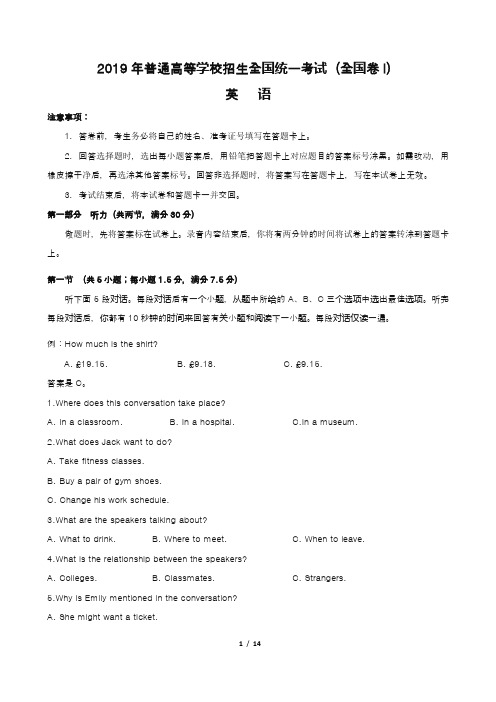
2019年普通高等学校招生全国统一考试(全国卷I)英语注意事项:1.答卷前,考生务必将自己的姓名、准考证号填写在答题卡上。
2.回答选择题时,选出每小题答案后,用铅笔把答题卡上对应题目的答案标号涂黑。
如需改动,用橡皮擦干净后,再选涂其他答案标号。
回答非选择题时,将答案写在答题卡上,写在本试卷上无效。
3.考试结束后,将本试卷和答题卡一并交回。
第一部分听力(共两节,满分30分)做题时,先将答案标在试卷上。
录音内容结束后,你将有两分钟的时间将试卷上的答案转涂到答题卡上。
第一节(共5小题;每小题1.5分,满分7.5分)听下面5段对话。
每段对话后有一个小题,从题中所给的A、B、C三个选项中选出最佳选项。
听完每段对话后,你都有10秒钟的时间来回答有关小题和阅读下一小题。
每段对话仅读一遍。
例:How much is the shirt?A. £19.15.B. £9.18.C. £9.15.答案是C。
1.Where does this conversation take place?A. In a classroom.B. In a hospital.C.In a museum.2.What does Jack want to do?A. Take fitness classes.B. Buy a pair of gym shoes.C. Change his work schedule.3.What are the speakers talking about?A. What to drink.B. Where to meet.C. When to leave.4.What is the relationship between the speakers?A. Colleges.B. Classmates.C. Strangers.5.Why is Emily mentioned in the conversation?A. She might want a ticket.B. She is looking for the man.C. She has an extra ticket.第二节(共15小题,每小题1.5分,满分22.5分)听下面5段对话或独白。
2019年高考英语全国1卷(附答案)
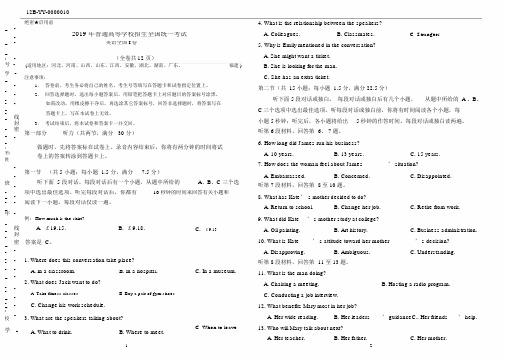
12B-YY-0000010-绝密★启用前__2019 年普通高等学校招生全国统一考试_-__-英语全国I卷__-(全卷共12 页):号 -(适用地区:河北、河南、山西、山东、江西、安徽、湖北、湖南、广东、福建 )学-注意事项:__-1.答卷前,考生务必将自己的姓名、考生号等填写在答题卡和试卷指定位置上。
___-2.回答选择题时,选出每小题答案后,用铅笔把答题卡上对应题目的答案标号涂黑。
___-如需改动,用橡皮擦干净后,再选涂其它答案标号,回答非选择题时,将答案写在___答题卡上,写在本试卷上无效。
_线__封3.考试结束后,将本试卷和答案卡一并交回。
__密_第一部分听力(共两节,满分 30 分)_-__做题时,先将答案标在试卷上。
录音内容结束后,你将有两分钟的时间将试:-名卷上的答案转涂到答题卡上。
姓--第一节(共 5 小题;每小题 1.5 分,满分7.5 分)-听下面 5 段对话。
每段对话后有一个小题,从题中所给的A、B、C 三个选班-__项中选出最佳选项。
听完每段对话后,你都有10 秒钟的时间来回答有关小题和_-__-阅读下一小题。
每段对话仅读一遍。
__4. What is the relationship between the speakers?A. Colleagues.B. Classmates.C. Strangers.5.Why is Emily mentioned in the conversation?A.She might want a ticket.B.She is looking for the man.C.She has an extra ticket.第二节(共 15小题;每小题 1.5分,满分 22.5分)听下面 5段对话或独白。
每段对话或独白后有几个小题,从题中所给的 A 、B、C三个选项中选出最佳选项。
听每段对话或独白前,你将有时间阅读各个小题,每小题 5秒钟;听完后,各小题将给出5秒钟的作答时间。
2019年高考全国1卷英语真题及答案(珍藏经典版)
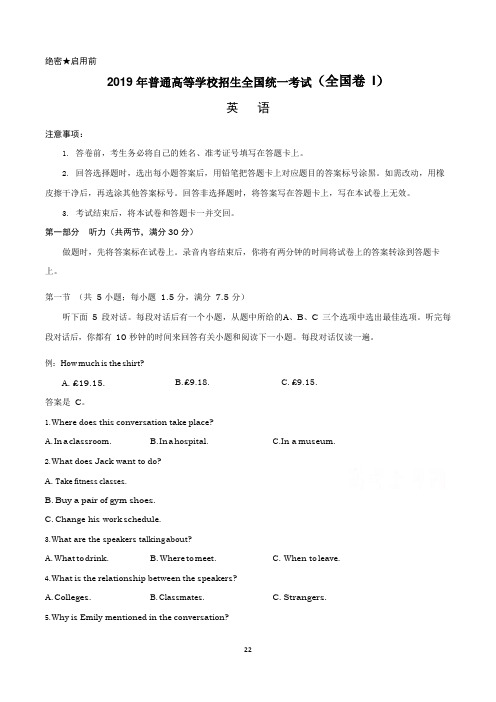
绝密★启用前2019 年普通高等学校招生全国统一考试(全国卷I)英语注意事项:1.答卷前,考生务必将自己的姓名、准考证号填写在答题卡上。
2.回答选择题时,选出每小题答案后,用铅笔把答题卡上对应题目的答案标号涂黑。
如需改动,用橡皮擦干净后,再选涂其他答案标号。
回答非选择题时,将答案写在答题卡上,写在本试卷上无效。
3.考试结束后,将本试卷和答题卡一并交回。
第一部分听力(共两节,满分30 分)做题时,先将答案标在试卷上。
录音内容结束后,你将有两分钟的时间将试卷上的答案转涂到答题卡上。
第一节(共 5 小题;每小题 1.5 分,满分7.5 分)听下面5 段对话。
每段对话后有一个小题,从题中所给的A、B、C 三个选项中选出最佳选项。
听完每段对话后,你都有10 秒钟的时间来回答有关小题和阅读下一小题。
每段对话仅读一遍。
例:How much is the shirt?A. £19.15.B. £9.18.C. £9.15.答案是C。
1.W here does this conversation take place?A. In a classroom.B. In a hospital.C.In a museum.2.W hat does Jack want to do?A.Take fitness classes.B.Buy a pair of gym shoes.C.Change his work schedule.3.W hat are the speakers talking a bout?A. What to drink.B. Where to meet.C. When to leave.4.W hat is the relationship between the speakers?A. Colleges.B. Classmates.C. Strangers.5.W hy is Emily mentioned in the conversation?A.She might want a t icket.B.She is looking for the man.C.She has an extra ticket.第二节(共15小题,每小题1.5分,满分22.5分)听下面5段对话或独白。
2019年全国I卷英语高考试题(含参考答案和答题卡).doc
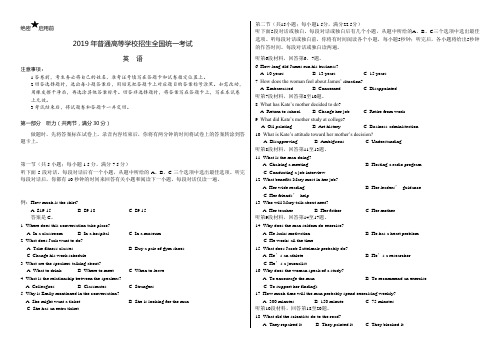
2019年普通高等学校招生全国统一考试英语注意事项:1.答卷前,考生务必将自己的姓名、准考证号填写在答题卡和试卷指定位置上。
2.回答选择题时,选出每小题答案后,用铅笔把答题卡上对应题目的答案标号涂黑。
如需改动,用橡皮擦干净后,再选涂其他答案标号。
回答非选择题时,将答案写在答题卡上,写在本试卷上无效。
3.考试结束后,将试题卷和答题卡一并交回。
第一部分听力(共两节,满分30分)做题时,先将答案标在试卷上。
录音内容结束后,你将有两分钟的时间将试卷上的答案转涂到答题卡上。
第一节(共5小题;每小题1.5分,满分7.5分)听下面5段对话。
每段对话后有一个小题,从题中所给的A、B、C三个选项中选出最佳选项。
听完每段对话后,你都有10秒钟的时间来回答有关小题和阅读下一小题。
每段对话仅读一遍。
例:How much is the shirt?A. £19.15.B. £9.18.C. £9.15.答案是C。
1. Where does this conversation take place?A. In a classroom.B. In a hospital.C. In a museum.2. What does Jack want to do?A. Take fitness classes.B. Buy a pair of gym shoes.C. Change his work schedule.3. What are the speakers talking about?A. What to drink.B. Where to meet.C. When to leave.4. What is the relationship between the speakers?A. Colleagues.B. Classmates.C. Strangers.5. Why is Emily mentioned in the conversation?A. She might want a ticket.B. She is looking for the man.C. She has an extra ticket. 第二节(共15小题;每小题1.5分,满分22.5分)听下面5段对话或独白。
2019年全国I卷英语高考试题(含参考答案和答题卡).doc

2019年普通高等学校招生全国统一考试英语注意事项:1.答卷前,考生务必将自己的姓名、准考证号填写在答题卡和试卷指定位置上。
2.回答选择题时,选出每小题答案后,用铅笔把答题卡上对应题目的答案标号涂黑。
如需改动,用橡皮擦干净后,再选涂其他答案标号。
回答非选择题时,将答案写在答题卡上,写在本试卷上无效。
3.考试结束后,将试题卷和答题卡一并交回。
第一部分听力(共两节,满分30分)做题时,先将答案标在试卷上。
录音内容结束后,你将有两分钟的时间将试卷上的答案转涂到答题卡上。
第一节(共5小题;每小题1.5分,满分7.5分)听下面5段对话。
每段对话后有一个小题,从题中所给的A、B、C三个选项中选出最佳选项。
听完每段对话后,你都有10秒钟的时间来回答有关小题和阅读下一小题。
每段对话仅读一遍。
例:How much is the shirt?A. £19.15.B. £9.18.C. £9.15.答案是C。
1. Where does this conversation take place?A. In a classroom.B. In a hospital.C. In a museum.2. What does Jack want to do?A. Take fitness classes.B. Buy a pair of gym shoes.C. Change his work schedule.3. What are the speakers talking about?A. What to drink.B. Where to meet.C. When to leave.4. What is the relationship between the speakers?A. Colleagues.B. Classmates.C. Strangers.5. Why is Emily mentioned in the conversation?A. She might want a ticket.B. She is looking for the man.C. She has an extra ticket. 第二节(共15小题;每小题1.5分,满分22.5分)听下面5段对话或独白。
(完整版)2019年全国高考英语卷1(附答案)

2019年普通高等学校招生全国统一考试(全国卷I)英 语注意事项:1.答卷前,考生务必将自己的姓名、准考证号填写在答题卡上。
2.回答选择题时,选出每小题答案后,用铅笔把答题卡上对应题目的答案标号涂黑。
如需改动,用橡皮擦干净后,再选涂其他答案标号。
回答非选择题时,将答案写在答题卡上,写在本试卷上无效。
3.考试结束后,将本试卷和答题卡一并交回。
第一部分 听力(共两节,满分30分)做题时,先将答案标在试卷上。
录音内容结束后,你将有两分钟的时间将试卷上的答案转涂到答题卡上。
第一节 (共5小题;每小题1.5分,满分7.5分)听下面5段对话。
每段对话后有一个小题,从题中所给的A、B、C三个选项中选出最佳选项。
听完每段对话后,你都有10秒钟的时间来回答有关小题和阅读下一小题。
每段对话仅读一遍。
例:How much is the shirt?A. £19.15.B. £9.18.C. £9.15.答案是C。
1.Where does this conversation take place?A. In a classroom.B. In a hospital.C.In a museum.2.What does Jack want to do?A. Take fitness classes.B. Buy a pair of gym shoes.C. Change his work schedule.3.What are the speakers talking about?A. What to drink.B. Where to meet.C. When to leave.4.What is the relationship between the speakers?A. Colleges.B. Classmates.C. Strangers.5.Why is Emily mentioned in the conversation?A. She might want a ticket.B. She is looking for the man.C. She has an extra ticket.第二节(共15小题,每小题1.5分,满分22.5分)听下面5段对话或独白。
2019年高考英语试题(全国Ⅰ卷)答案

2019年全国普通高等学校招生统一考试(全国Ⅰ卷)英语答案答案速查:第一部分听力1–5 BABCA 6–10 CBACC 11–15 BACAB 16–20 ACBAC第二部分阅读理解21–25 BDDBA 26–30 ACDCB 31–35 DCABA 36–40 EAGCD第三部分语言知识运用41–45 DCCBA 46–50 CDCAB 51–55 DABDA 56–60 CBDAB61.that 62.poorly 63.of/for 64.to perform 65.have reported 66.belief 67.noting 68.higher 69.the 70.are第二部分阅读理解第一节A体裁:应用文题材:广告主题:兼职活动【文章大意】本文介绍了学生在暑期可以兼职的四个项目。
21.B【解析】根据Summer Company中的“Summer Company provides students with hands-on business training and awards of up to $3,000 to start and run their own summer businesses”可知,这个项目给创业的学生提供高达三千美元的奖金。
Summer Company并没有提到在工作前不需要培训,故可排除A项;Summer Company没有提到工作环境,因此可排除C项;对比四个项目可知,这四个项目都是关于暑期工作的信息,Summer Company 并没有提供更多的工作信息,因此可排除D项。
22.D【解析】本题问Stewardship Youth Ranger Program要求的参与活动的学生的年龄范围。
根据本部分中的“Who is eligible:Students aged 16 or 17 at time of hire, but not turning 18 before December 31 this year”可知,学生的年龄应该在16–17岁,故选D。
2019年全国高考英语试卷(新课标Ⅰ)(含解析版)

2019年普通高等学校招生全国统一考试(新课标I)英语注意事项:1.答卷前,考生务必将自己的姓名、准考证号填写在答题卡上。
2.回答选择题时,选出每小题答案后,用铅笔把答题卡上对应题目的答案标号涂黑。
如需改动,用橡皮擦干净后,再选涂其他答案标号。
回答非选择题时,将答案写在答题卡上,写在本试卷上无效。
3.考试结束后,将本试卷和答题卡一并交回。
第二部分阅读理解(共两节,满分40分)第一节 (共15小题;每小题2分,满分30分)阅读下列短文,从每题所给的A、B、C和D四个选项中,选出最佳选项。
ANeed a Job This Summer?The provincial government and its partners offer many programs to help students find summer jobs. The deadlines and what you need to apply depend on the program.Not a student? Go to the government website to learn about programs and online tools available to help people under 30 build skills, find a job or start businesses all year round.Jobs for YouthIf you are a teenager living in certain parts of the province, you could be eligible(符合条件)for this program. Which provides eight weeks of paid employment along with training.Who is eligible: Youth 15-18 years old in select communities(社区).Summer CompanySummer Company provides students with hands-on business training and awards of up to $3,000 to start and run their own summer businesses.Who is eligible: Students aged 15-29, returning to school in the fall.Stewardship Youth Ranger ProgramYou could apply to be a Stewardship Youth Ranger and work on local natural resource management projects for eight weeks this summer.Who is eligible: Students aged 16 or 17 at time of hire, but not turning 18 before December 31 this year.Summer Employment Opportunities(机会)Through the Summer Employment Opportunities program, students are hired each year in a variety of summer positions across the Provincial Public Service, its related agencies and community groups.Who is eligible: Students aged 15 or older.Some positions require students to be 15 to 24 or up to 29 for persons with a disability.21. What is special about Summer Company?A. It requires no training before employment.B. It provides awards for running new businesses.C. It allows one to work in the natural environment.D. It offers more summer job opportunities.22. What is the age range required by Stewardship Youth Ranger Program?A. 15-18.B. 15-24.C. 15-29.D. 16-17.23. Which program favors the disabled?A. Jobs for Youth.B. Summer Company.C. Stewardship Youth Ranger Program.D. Summer Employment Opportunities.BFor Canaan Elementary’s second grade in Patchogue, N.Y.,toda y is speech day ,and right now it’s Chris Palaez’s turn. The 8-year-old is the joker of the class. With shining dark eyes, he seems like the of kid who would enjoy public speaking.But he’s, nervous.“I’m here to tell you today why you should … should…”Chris trips on the“-ld,”a. pronunciation difficulty for many non-native English speakers. His teacher ,Thomas Whaley ,is next to him, whispering support.“…Vote for …me …”Except for some stumbles, Chris is doing amazingly well. When he brings his speech to a nice conclusion ,Whaley invites the rest of the class to praise him.A son of immigrants, Chris stared learning English a little over three years ago. Whaley recalls(回想起)how at the beginning of the year,when called upon to read,Chris would excuse himself to go to the bathroom.Learning English as a second language can be a painful experience. What you need is a great teacher who lets you make mistakes. “It takes a lot for any student,” Whaley explains,“especially for a student who is learning English as their new language,to feel confident enough to say,‘I don’t know,but I want to know.’”Whaley got the idea of this second-grade presidential campaign project when he asked the children one day to raise their hands if they thought they could never be a president. The answer broke his heart. Whaley says the project is about more than just learning to read and speak in public. He wants these kids to learn to boast(夸耀)about themselves.“Boasting about yourself,and your best qualities,” Whaley says,“is very difficult for a child who came into the classroom not feeling confident.”24. What made Chris nervous?A. Telling a story.B. Making a speech.C. Taking a test.D. Answering a question.25. What does the underlined word “stumbles” in paragraph 2 refer to?A. Improper pauses.B. Bad manners.C. Spelling mistakes.D. Silly jokes.26. We can infer that the purpose of Whaley’s project is to _________.A. help students see their own strengthsB. assess students’ public speaking skillsC. prepare students for their future jobsD. inspire students’ love for politics27. Which of the following best describes Whaley as a teacher?A. Humorous.B. Ambitious.C. Caring.D. Demanding.CAs data and identity theft becomes more and more common, the market is growing for biometric(生物测量)technologies—like fingerprint scans—to keep others out of private e-spaces. At present, these technologies are still expensive, though.Researchers from Georgia Tech say that they have come up with a low-cost device(装置)that gets around this problem: a smart keyboard. This smart keyboard precisely measures the cadence(节奏)with which one types and the pressure fingers apply to each key. The keyboard could offer a strong layer of security by analyzing things like the force of a user's typing and the time between key presses. These patterns are unique to each person. Thus, the keyboard can determine people's identities, and by extension, whether they should be given access to the computer it's connected to—regardless of whether someone gets the password right.It also doesn't require a new type of technology that people aren't already familiar with. Everybody uses akeyboard and everybody types differently.In a study describing the technology, the researchers had 100 volunteers type the word “touch”four times using the smart keyboard. Data collected from the device could be used to recognize different participants based on how they typed, with very low error rates. The researchers say that the keyboard should be pretty straightforward to commercialize and is mostly made of inexpensive, plastic-like parts. The team hopes to make it to market in the near future.28. Why do the researchers develop the smart keyboard?A. To reduce pressure on keys.B. To improve accuracy in typingC. To replace the password system.D. To cut the cost of e-space protection.29. What makes the invention of the smart keyboard possible?A. Computers are much easier to operate.B. Fingerprint scanning techniques develop fast.C. Typing patterns vary from person to person.D. Data security measures are guaranteed.30. What do the researchers expect of the smart keyboard?all 1o soisgitieoco oll.A. It'll be environment-friendly.B. It'll reach consumers soon.C. It'll be made of plastics.D. It'll help speed up typing.31. Where is this text most likely from?A. A diary.B. A guidebookC. A novel.D. A magazine.DDuring the rosy years of elementary school(小学), I enjoyed sharing my dolls and jokes, which allowed me to keep my high social status. I was the queen of the playground. Then came my tweens and teens, and mean girls and cool kids. They rose in the ranks not by being friendly but by smoking cigarettes, breaking rules and playing jokes on others, among whom I soon found myself.Popularity is a well-explored subject in social psychology. Mitch Prinstein, a professor of clinical psychology sorts the popular into two categories: the likable and the status seekers. The likables’ plays-well-with-others qualities strengthen schoolyard friendships, jump-start interpersonal skills and, when tapped early, are employed ever after in life and work. Then there’s the kind of popularity that appears in adolescence: status born of power and even dishonorable behavior.Enviable as the cool kids may have seemed, Dr. Prinstein’s studies show unpleasant co nsequences. Those who were highest in status in high school, as well as those least liked in elementary school, are “most likely to engage(从事)in dangerous and risky behavior.”In one study, Dr. Prinstein examined the two types of popularity in 235 adolescents, scoring the least liked, the most liked and the highest in status based on student surveys(调查研究). “We found that the least well-liked teens had become more aggressive over time toward their classmates. But so had those who were high in status. It clearly showed that while likability can lead to healthy adjustment, high status has just the opposite effect on us."Dr. Prinstein has also found that the qualities that made the neighbors want you on a play date-sharing, kindness, openness — carry over to later years and make you better able to relate and connect with others.In analyzing his and other research,Dr. Prinstein came to another conclusion: Not only is likability related to positive life outcomes, but it is also responsible for those outcomes, too. "Being liked creates opportunities for learning and for new kinds of life experiences that help somebody gain an advantage, ” he said.32. What sort of girl was the author in her early years of elementary school?A. Unkind.B. Lonely.C. Generous.D. Cool.33. What is the second paragraph mainly about?A. The classification of the popular.B. The characteristics of adolescents.C.The importance of interpersonal skills.D. The causes of dishonorable behavior.34. What did Dr. Prinstein’s study find about the most liked kids?A. They appeared to be aggressive.B. They tended to be more adaptable.C. They enjoyed the highest status.D. They performed well academically.35. What is the best title for the text?A. Be Nice-You Won’t Finish LastB. The Higher the Status, the BeerC. Be the Best-You Can Make ItD. More Self-Control, Less Aggressiveness第二节 (共5小题;每小题2分,满分10分)根据短文内容,从短文后的选项中选出能填入空白处的最佳选项。
2019年全国统一高考英语真题试卷以及答案(全国1卷解析版)-19年全国一英语
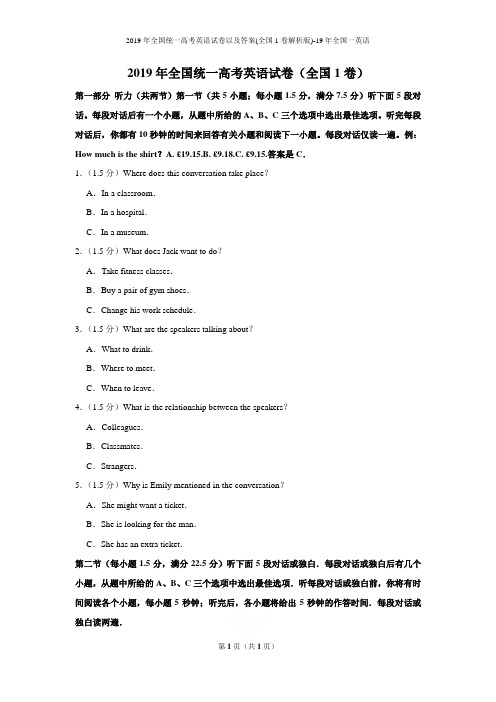
2019年全国统一高考英语试卷(全国1卷)第一部分听力(共两节)第一节(共5小题;每小题1.5分,满分7.5分)听下面5段对话。
每段对话后有一个小题,从题中所给的A、B、C三个选项中选出最佳选项。
听完每段对话后,你都有10秒钟的时间来回答有关小题和阅读下一小题。
每段对话仅读一遍。
例:How much is the shirt?A. £19.15.B. £9.18.C. £9.15.答案是C.1.(1.5分)Where does this conversation take place?A.In a classroom.B.In a hospital.C.In a museum.2.(1.5分)What does Jack want to do?A.Take fitness classes.B.Buy a pair of gym shoes.C.Change his work schedule.3.(1.5分)What are the speakers talking about?A.What to drink.B.Where to meet.C.When to leave.4.(1.5分)What is the relationship between the speakers?A.Colleagues.B.Classmates.C.Strangers.5.(1.5分)Why is Emily mentioned in the conversation?A.She might want a ticket.B.She is looking for the man.C.She has an extra ticket.第二节(每小题1.5分,满分22.5分)听下面5段对话或独白.每段对话或独白后有几个小题,从题中所给的A、B、C三个选项中选出最佳选项.听每段对话或独白前,你将有时间阅读各个小题,每小题5秒钟;听完后,各小题将给出5秒钟的作答时间.每段对话或独白读两遍.6.(3分)听材料,回答下列问题.(1)How long did James run his business?A.10 years.B.13 years.C.15 years.(2)How does the woman feel about James' situation?A.Embarrassed.B.Concerned.C.Disappointed.7.(4.5分)听材料,回答下列问题.(1)What has Kate's mother decided to do?A.Return to school.B.Change her job.C.Retire from work.(2)What did Kate's mother study at college?A.Oil painting.B.Art history.C.Business administration.(3)What is Kate's attitude toward her mother's decision?A.Disapproving.B.Ambiguous.C.Understanding.8.(4.5分)听材料,回答下列问题.(1)What is the man doing?A.Chairing a meeting.B.Hosting a radio program.C.Conducting a job interview.(2)What benefits Mary most in her job?A.Her wide reading.B.Her leaders' guidance.C.Her friends' help.(3)Who will Mary talk about next?A.Her teacher.B.Her father.C.Her mother.9.(6分)听材料,回答下列问题.(1)Why does the man seldom do exercise?A.He lacks motivation.B.He has a heart problem.C.He works all the time.(2)What does Jacob Sattelmair probably do?A.He's an athlete.B.He's a researcher.C.He's a journalist.(3)Why does the woman speak of a study?A.To encourage the man.B.To recommend an exercise.C.To support her findings.(4)How much time will the man probably spend exercising weekly?A.300 minutes.B.150 minutes.C.75 minutes.10.(4.5分)听材料,回答下列问题.(1)What did the scientists do to the road?A.They repaired it.B.They painted it.C.They blocked it.(2)Why are young birds drawn to the road surface?A.It's warm.B.It's brown.C.It's smooth.(3)What is the purpose of the scientists' experiment?A.To keep the birds there for a whole year.B.To help students study the birds well.C.To prevent the birds from being killed.第二部分阅读理解(共两节)第一节(满分30分)阅读下列短文,从每题所给的A、B、C和D四个选项中,选出最佳选项。
2019年高考英语全国1卷含答案
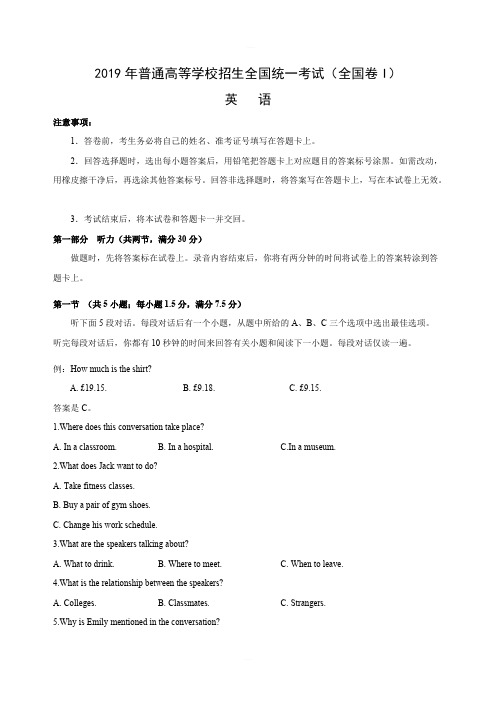
2019年普通高等学校招生全国统一考试(全国卷I)英语注意事项:1.答卷前,考生务必将自己的姓名、准考证号填写在答题卡上。
2.回答选择题时,选出每小题答案后,用铅笔把答题卡上对应题目的答案标号涂黑。
如需改动,用橡皮擦干净后,再选涂其他答案标号。
回答非选择题时,将答案写在答题卡上,写在本试卷上无效。
3.考试结束后,将本试卷和答题卡一并交回。
第一部分听力(共两节,满分30分)做题时,先将答案标在试卷上。
录音内容结束后,你将有两分钟的时间将试卷上的答案转涂到答题卡上。
第一节(共5小题;每小题1.5分,满分7.5分)听下面5段对话。
每段对话后有一个小题,从题中所给的A、B、C三个选项中选出最佳选项。
听完每段对话后,你都有10秒钟的时间来回答有关小题和阅读下一小题。
每段对话仅读一遍。
例:How much is the shirt?A. £19.15.B. £9.18.C. £9.15.答案是C。
1.Where does this conversation take place?A. In a classroom.B. In a hospital.C.In a museum.2.What does Jack want to do?A. Take fitness classes.B. Buy a pair of gym shoes.C. Change his work schedule.3.What are the speakers talking about?A. What to drink.B. Where to meet.C. When to leave.4.What is the relationship between the speakers?A. Colleges.B. Classmates.C. Strangers.5.Why is Emily mentioned in the conversation?A. She might want a ticket.B. She is looking for the man.C. She has an extra ticket.第二节(共15小题,每小题1.5分,满分22.5分)听下面5段对话或独白。
2019年全国统一高考英语试卷(新课标Ⅰ)(含答案)

2019年普通高等学校招生全国统一考试(全国卷I)英语注意事项:1.答卷前,考生务必将自己的姓名、准考证号填写在答题卡上。
2.回答选择题时,选出每小题答案后,用铅笔把答题卡上对应题目的答案标号涂黑。
如需改动,用橡皮擦干净后,再选涂其他答案标号。
回答非选择题时,将答案写在答题卡上,写在本试卷上无效。
3.考试结束后,将本试卷和答题卡一并交回。
第一部分听力(共两节,满分30分)做题时,先将答案标在试卷上。
录音内容结束后,你将有两分钟的时间将试卷上的答案转涂到答题卡上。
第一节 (共5小题;每小题1.5分,满分7.5分)听下面5段对话。
每段对话后有一个小题,从题中所给的A、B、C三个选项中选出最佳选项。
听完每段对话后,你都有10秒钟的时间来回答有关小题和阅读下一小题。
每段对话仅读一遍。
例:How much is the shirt?A. £19.15.B. £9.18.C. £9.15.答案是C。
1.Where does this conversation take place?A. In a classroom.B. In a hospital.C. In a museum. 【答案】B2.What does Jack want to do?A. Take fitness classes.B. Buy a pair of gym shoes.C. Change his work schedule.【答案】A3.What are the speakers talking about?A. What to drink.B. Where to meet.C. When to leave. 【答案】B4.What is the relationship between the speakers?A. Colleges.B. Classmates.C. Strangers.【答案】C5.Why is Emily mentioned in the conversation?A. She might want a ticket.B. She is looking for the man.C. She has an extra ticket.【答案】A第二节(共15小题,每小题1.5分,满分22.5分)听下面5段对话或独白。
2019年高考英语全国卷答案
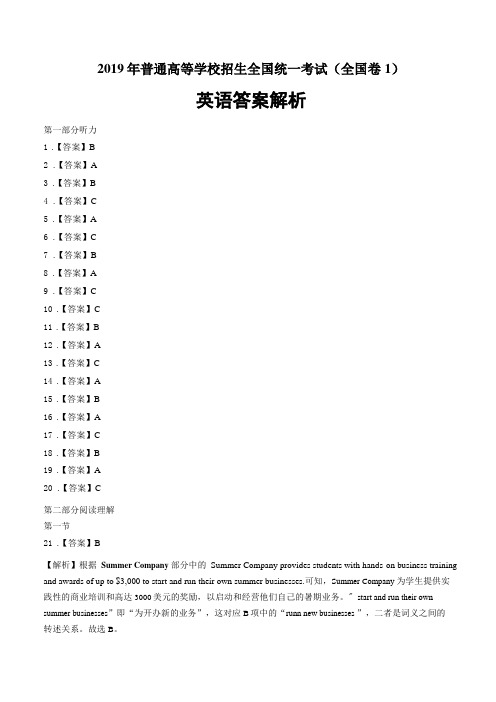
2019年普通高等学校招生全国统一考试(全国卷1)英语答案解析第一部分听力1.【答案】B2.【答案】A3.【答案】B4.【答案】C5.【答案】A6.【答案】C7.【答案】B8.【答案】A9.【答案】C10.【答案】C11.【答案】B12.【答案】A13.【答案】C14.【答案】A15.【答案】B16.【答案】A17.【答案】C18.【答案】B19.【答案】A20.【答案】C第二部分阅读理解第一节21.【答案】B【解析】根据Summer Company 部分中的Summer Company provides students with hands-on business training and awards of up to $3,000 to start and run their own summer businesses.可知,Summer Company 为学生提供实践性的商业培训和高达3000美元的奖励,以启动和经营他们自己的暑期业务。
" start and run their own summer businesses”即“为开办新的业务”,这对应B项中的“runn new businesses ”,二者是词义之间的转述关系。
故选B。
【考点】细节理解22.【答案】D【解析】根据Stewardship Youth Ranger Program部分中Who is eligible: Students aged 16 or 17 at time of hire, but not turning 18 before December 31 this yeailT知,符合条件的学生是16岁或17岁的学生,但在今年12月31日之前未满18岁。
由此得出,这个项目要求年龄在16-17岁之间。
故选D。
【考点】细节理解23.【答案】D【解析】根据Summer Employment Opportunities部分中最后一句Some positions require students to be 15 to 24 or up to 29 for persons with a disability可知,Summer Employment Opportunities有些职位是给残疾人的。
【高考卷】2019年全国卷Ⅰ英语试卷及答案

2019年普通高等学校招生全国统一考试(全国卷I)第一部分听力(共两节,满分30分)第一节(共5小题;每小题1.5分,满分7.5分)听下面5段对话。
每段对话仅读一遍。
1.Where does this conversation take place?A. In a classroom.B. In a hospital.C. In a museum.2.What does Jack want to do?A. Take fitness classes.B. Buy a pair of gym shoes.C. Change his work schedule.3.What are the speakers talking about?A. What to drink.B. Where to meet.C. When to leave.4.What is the relationship between the speakers?A. Colleagues.B. Classmates.C. Strangers.5.Why is Emily mentioned in the conversation?A. She might want a ticket.B. She is looking for the man.C. She has an extra ticket.第二节(共15小题,每小题1.5分,满分22.5分)听下面5段对话或独白,每段对话或独白读两遍。
听第6段材料,回答第6、7题。
6.How long did James run his business?A.10 years.B.13years.C.15 years.7.How does the woman feel about James' situation?A. Embarrassed.B. Concerned.C. Disappointed. 听第7段材料,回答第8至10题。
2019年全国I卷英语高考试题(含参考答案和答题卡).doc
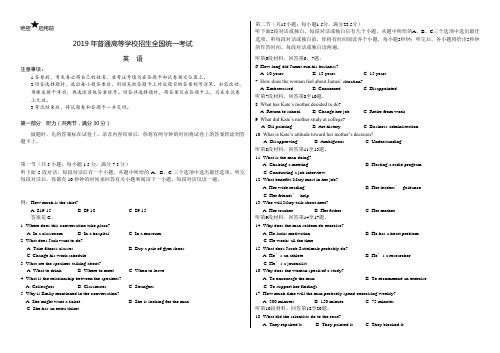
2019年普通高等学校招生全国统一考试英语注意事项:1.答卷前,考生务必将自己的姓名、准考证号填写在答题卡和试卷指定位置上。
2.回答选择题时,选出每小题答案后,用铅笔把答题卡上对应题目的答案标号涂黑。
如需改动,用橡皮擦干净后,再选涂其他答案标号。
回答非选择题时,将答案写在答题卡上,写在本试卷上无效。
3.考试结束后,将试题卷和答题卡一并交回。
第一部分听力(共两节,满分30分)做题时,先将答案标在试卷上。
录音内容结束后,你将有两分钟的时间将试卷上的答案转涂到答题卡上。
第一节(共5小题;每小题1.5分,满分7.5分)听下面5段对话。
每段对话后有一个小题,从题中所给的A、B、C三个选项中选出最佳选项。
听完每段对话后,你都有10秒钟的时间来回答有关小题和阅读下一小题。
每段对话仅读一遍。
例:How much is the shirt?A. £19.15.B. £9.18.C. £9.15.答案是C。
1. Where does this conversation take place?A. In a classroom.B. In a hospital.C. In a museum.2. What does Jack want to do?A. Take fitness classes.B. Buy a pair of gym shoes.C. Change his work schedule.3. What are the speakers talking about?A. What to drink.B. Where to meet.C. When to leave.4. What is the relationship between the speakers?A. Colleagues.B. Classmates.C. Strangers.5. Why is Emily mentioned in the conversation?A. She might want a ticket.B. She is looking for the man.C. She has an extra ticket. 第二节(共15小题;每小题1.5分,满分22.5分)听下面5段对话或独白。
2019高考全国卷英语

2019年普通高等学校招生全国统一考试(全国卷I)英语第一部分听力(共两节,满分30分)第一节(共5小题;每小题1.5分,满分7.5分)听下面5段对话。
每段对话后有一个小题,从题中所给的A、B、C三个选项中选出最佳选项。
听完每段对话后,你都有10秒钟的时间来回答有关小题和阅读下一小题。
每段对话仅读一遍。
例:How much is the shirt?A. £19.15.B. £9.18.C. £9.15.第二节(共15小题,每小题1.5分,满分22.5分)听下面5段对话或独白。
每段对话或独白后有几个小题,从题中所给的A、B、C三个选项中选出最佳选项。
听每段对话或独白前,你将有时间阅读各个小题,每小题5秒钟;听完后,各小题将给出5秒钟的作答时间。
每段对话或独白读两遍。
第二部分阅读理解(共两节,满分40分)第一节(共15小题;每小题2分,满分30分)阅读下列短文,从每题所给的A、B、C和D四个选项中,选出最佳选项。
ANeed a Job This Summer?The provincial government and its partners offer many programs to help students find summer jobs. The deadlines and what you need to apply depend on the program.Not a student? Go to the government website to learn about programs and online tools available to help people under 30 build skills, find a job or start businesses all year round.Jobs for YouthIf you are a teenager living in certain parts of the province, you could be eligible(符合条件)for this program. Which provides eight weeks of paid employment along with training.Who is eligible: Youth 15-18 years old in select communities(社区).Summer CompanySummer Company provides students with hands-on business training and awards of up to $3,000 to start and run their own summer businesses.Who is eligible: Students aged 15-29, returning to school in the fall.Stewardship Youth Ranger ProgramYou could apply to be a Stewardship Youth Ranger and work on local natural resource management projects for eight weeks this summer.Who is eligible: Students aged 16 or 17 at time of hire, but not turning 18 before December 31 this year.Summer Employment Opportunities(机会)Through the Summer Employment Opportunities program, students are hired each year in a variety of summer positions across the Provincial Public Service, its related agencies and community groups.Who is eligible: Students aged 15 or older. Some positions require students to be 15 to 24 or up to 29 for persons with a disability.21. What is special about Summer Company?A. It requires no training before employment.B. It provides awards for running new businesses.C. It allows one to work in the natural environment.D. It offers more summer job opportunities.22. What is the age range required by Stewardship Youth Ranger Program?A.15-18.B.15-24.C.15-29.D.16-17.23. Which program favors the disabled?A. Jobs for Youth.B. Summer Company.C. Stewardship Youth Ranger Program.D. Summer Employment Opportunities.BFor Canaan Elementary’s second grade in Patchogue, N.Y.,today is speech day ,and right now it’s Chris Palaez’s turn. The 8-year-old is the joker of the class. With shining dark eyes, he seems like the of kid who would enjoy public speaking.But he’s, nervous.“I’m here to tell you today why you should …should…”Chris trips on the“-ld,”a. pronunciation difficulty for many non-native English speakers. His teacher ,Thomas Whaley ,is next to him, whispering support.“…V ote for …me …”Except for some stumbles, Chris is doing amazingly well. When he brings his speech to a nice conclusion ,Whaley invites the rest of the class to praise him.A son of immigrants, Chris stared learning English a little over three years ago. Whaley recalls(回想起)how at the beginning of the year,when called upon to read,Chris would excuse himself to go to the bathroom.Learning English as a second language can be a painful experience. What you need is a great teacher who lets you make mistakes. “It takes a lot for any student,”Whaley explains,“especially for a student who is learning English as their new language,to feel confident enough to say,‘I don’t know,but I want to know.’”Whaley got the idea of this second-grade presidential campaign project when he asked the children one day to raise their hands if they thought they could never be a president. The answer broke his heart. Whaley says the project is about more than just learning to read and speak in public. He wants these kids to learn to boast(夸耀)about themselves.“Boasting about yourself,and your best qualities,”Whaley says,“is very difficult for a child who came into the classroom not feeling confident.”24. What made Chris nervous?A. Telling a story.B. Making a speech.C. Taking a test.D. Answering a question.25. What does the underlined word “stumbles”in paragraph 2 refer to?A. Improper pauses.B. Bad manners.C. Spelling mistakes.D. Silly jokes.26. We can infer that the purpose of Whaley’s project is to _________.A. help students see their own strengthsB. assess students’public speaking skillsC. prepare students for their future jobsD. inspire students’love for politics27. Which of the following best describes Whaley as a teacher?A. Humorous.B. Ambitious.C. Caring.D. Demanding.CAs data and identity theft becomes more and more common, the market is growing for biometric(生物测量)technologies—like fingerprint scans—to keep others out of private e-spaces. At present, these technologies are still expensive, though.Researchers from Georgia Tech say that they have come up with a low-cost device(装置)that gets around this problem: a smart keyboard. This smart keyboard precisely measures the cadence(节奏)with which one types and the pressure fingers apply to each key. The keyboard could offer a strong layer of security by analyzing things like the force of a user's typing and the time between key presses. These patterns are unique to each person. Thus, the keyboard can determine people's identities, and by extension, whether they should be given access to the computer it's connected to—regardless of whether someone gets the password right.It also doesn't require a new type of technology that people aren't already familiar with. Everybody uses a keyboard and everybody types differently.In a study describing the technology, the researchers had 100 volunteers type the word “touch”four times using the smart keyboard. Data collected from the device could be used to recognize different participants based on how they typed, with very low error rates. The researchers say that the keyboard should be pretty straightforward to commercialize and is mostly made of inexpensive, plastic-like parts. The team hopes to make it to market in the near future.28. Why do the researchers develop the smart keyboard?A. To reduce pressure on keys.B. To improve accuracy in typingC. To replace the password system.D. To cut the cost of e-space protection.29. What makes the invention of the smart keyboard possible?A. Computers are much easier to operate.B. Fingerprint scanning techniques develop fast.C. Typing patterns vary from person to person.D. Data security measures are guaranteed.30. What do the researchers expect of the smart keyboard?all 1o soisgitieoco oll.A. It'll be environment-friendly.B. It'll reach consumers soon.C. It'll be made of plastics.D. It'll help speed up typing.31. Where is this text most likely from?A. A diary.B.A guidebookC. A novel.D. A magazine.DDuring the rosy years of elementary school(小学), I enjoyed sharing my dolls and jokes, which allowed me to keep my high social status. I was the queen of the playground. Then came my tweens and teens, and mean girls and cool kids. They rose in the ranks not by being friendly but by smoking cigarettes, breaking rules and playing jokes on others, among whom I soon found myself.Popularity is a well-explored subject in social psychology. Mitch Prinstein, a professor of clinical psychology sorts the popular into two categories: the likable and the status seekers. The likables’plays-well-with-others qualities strengthen schoolyard friendships, jump-start interpersonal skills and, when tapped early, are employed ever after in life and work. Then there’s the kind of popularity that appears in adolescence: status born of power and even dishonorable behavior.Enviable as the cool kids may have seemed, Dr. Prinstein’s studies show unpleasant consequences. Those who were highest in status in high school, as well as those least liked in elementary school, are “most likely to engage(从事)in dangerous and risky behavior.”In one study, Dr. Prinstein examined the two types of popularity in 235 adolescents, scoring the least liked, the most liked and the highest in status based on student surveys(调查研究). “We found that the least well-liked teens had become more aggressive over time toward their classmates. But so had those who were high in status. It clearly showed that while likability can lead to healthy adjustment, high status has just the opposite effect on us."Dr. Prinstein has also found that the qualities that made the neighbors want you on a play date-sharing, kindness, openness —carry over to later years and make you better able to relate and connect with others.In analyzing his and other research,Dr. Prinstein came to another conclusion: Not only is likability related to positive life outcomes, but it is also responsible for those outcomes, too. "Being liked creates opportunities for learning and for new kinds of life experiences that help somebody gain an advantage, ”he said.32. What sort of girl was the author in her early years of elementary school?A. Unkind.B. Lonely.C. Generous.D. Cool.33.What is the second paragraph mainly about?A. The classification of the popular.B. The characteristics of adolescents.C. The importance of interpersonal skills.D. The causes of dishonorable behavior.34. What did Dr. Prinstein’s study find about the most liked kids?A. They appeared to be aggressive.B. They tended to be more adaptable.C. They enjoyed the highest status.D. They performed well academically.35. What is the best title for the text?A. Be Nice-You Won’t Finish LastB. The Higher the Status, the BeerC. Be the Best-You Can Make ItD. More Self-Control, Less Aggressiveness第二节(共5小题;每小题2分,满分10分)根据短文内容,从短文后的选项中选出能填入空白处的最佳选项。
2019年高考英语真题(全国卷I)含答案
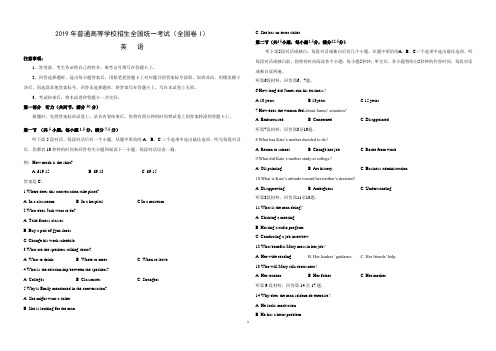
2019年普通高等学校招生全国统一考试(全国卷I)英语注意事项:1.答卷前,考生务必将自己的姓名、准考证号填写在答题卡上。
2.回答选择题时,选出每小题答案后,用铅笔把答题卡上对应题目的答案标号涂黑。
如需改动,用橡皮擦干净后,再选涂其他答案标号。
回答非选择题时,将答案写在答题卡上,写在本试卷上无效。
3.考试结束后,将本试卷和答题卡一并交回。
第一部分听力(共两节,满分30分)做题时,先将答案标在试卷上。
录音内容结束后,你将有两分钟的时间将试卷上的答案转涂到答题卡上。
第一节(共5小题;每小题1.5分,满分7.5分)听下面5段对话。
每段对话后有一个小题,从题中所给的A、B、C三个选项中选出最佳选项。
听完每段对话后,你都有10秒钟的时间来回答有关小题和阅读下一小题。
每段对话仅读一遍。
例:How much is the shirt?A. £19.15.B. £9.18.C. £9.15.答案是C。
1.Where does this conversation take place?A. In a classroom.B. In a hospital.C.In a museum.2.What does Jack want to do?A. Take fitness classes.B. Buy a pair of gym shoes.C. Change his work schedule.3.What are the speakers talking about?A. What to drink.B. Where to meet.C. When to leave.4.What is the relationship between the speakers?A. Colleges.B. Classmates.C. Strangers.5.Why is Emily mentioned in the conversation?A. She might want a ticket.B. She is looking for the man.C. She has an extra ticket.第二节(共15小题,每小题1.5分,满分22.5分)听下面5段对话或独白。
- 1、下载文档前请自行甄别文档内容的完整性,平台不提供额外的编辑、内容补充、找答案等附加服务。
- 2、"仅部分预览"的文档,不可在线预览部分如存在完整性等问题,可反馈申请退款(可完整预览的文档不适用该条件!)。
- 3、如文档侵犯您的权益,请联系客服反馈,我们会尽快为您处理(人工客服工作时间:9:00-18:30)。
高等学校招生全国统一考试押题真卷英语第一卷(三部门,共115分)听力试题第一部分:听力(共两节,满分30分)作题时,先将答案划在试卷上。
录音内容结束后,你将有两分钟的时间将试卷上的答案转涂到答题卡上。
第一节(共5小题;每小题1.5分,满分7.5分)听下面5段对话。
每段对话后有一个小题,从题中所给的A、B、C三个选项中选出最佳选项,并标在试卷的相应位置。
听完每段对话后,你都有10秒钟的时间来回答在关小题和阅读下一小题。
每段对话仅读一遍。
例:How much is the shirt ?A.£19.15 B.£9.15 C.£9.18 答案是B。
1.Where did this conversation most probably take place ?A.At a concert . B.At a flower shop . C.At a restaurant .2.What did Paul do this moming ?A.He had a history lsson . B.He had a chemistry lesson . C.He attended a mecting .3.What can we lean about the man from the conversation ?A.He’s anxious to see his sister .B.He wrote to his sister last month.C.He’s expecting a letter from his sister .4.At what time does the train to Leeds leave ?A.3:00 B.3:15 C.5:005.W hat is the man’s problem?A.He can’t decide how to go .B.He can’t drive himself .C.H e doesn’t like traveling by train .第二节(共15小题,每小题1.5分,满分22.5分)听下面5段对话或独白。
每段对话或独白后有几个小题,从题中所给的三个选项中选出最佳选项,并标在试卷的相应位置。
听每段对话或独白前,你将有时间阅读各个小题,每小题5秒钟;听完后,各小题将给出5秒钟的作答时间。
每段对话或独白读两遍。
听第6段材料,回答第6至8题。
6.What is Sally doing ?A.Reading a letter . B.Washing clothes . C.Making a phone call .7.Where does Tom ask Sally and John to call him ?A.He wants to meet them at the station .B.He wants to invite them to dinner .C.He wants them to visit his family .8.What is Tom’s telephone number ?A.680-6840. B.780-6842. C.780-7842.听第7段材料,回答第9至11题。
9.Why did Bob call Nancy ?A.To ask if she’s got the tickets .B.To invite her our for an evening .C.To offer his help with her new flat .10.What will Nancy be doing next Saturday afternoon ? A.Watching a tennis match .B.Cleaning up the new flat .C.Visiting a friend with Margaret .11.What has Nancy agreed to do with Bob next Saturday ? A.To see a play . B.To attend a concert . C.To buy concert tickets .听第8段材料,回答第12至14题。
12.Who are the speakers ?A.A passer-by and a policeman . B.A passer-by and a driver .C.A passenger and a taxi-driver .13.What is the woman’s house number ?A.1323. B.3023. C.4023.14.Why can’t the man turn left ?A.It is rush hour . B.It is a one –way street . C.The street is too narrow .听第9段材料,回答第15至17题。
15.What did the man ask the woman to do ?A.To book a hotel room for him .B.To meet an old friend of hers .C.To pass a message to Mary .16.What is the relationship between the two speakers ? A.Neighbors . B.Father and daughter . C.Husband and wife .17.What is Mary probably doing ?A.Staying at a hotel . B.Talking on the phone . C.Chatting with her husband .听第10段材料,回答第18至20题。
18.Who is the speaker ?A.A student . B.A teacher . C.An office clerk . 19.Why did the speaker get a parking ticket ?A.His car was parked for too long .B.His car took up too much space .C.He left car in a wrong place .20.Which of the following words best describes the day the speaker had ?A.exciting . B.unlucky . C.tiring .非听力试题第二部分:英语知识运用(共两节,满分45分)从A、B、C、D四个选项中,选出可以填入空白处的最佳选项,并在答题卡上将该项涂黑。
例:It is generally considered unwise to give a child he or she wants .A.however B.whatever C.whichever D.whenever 答案是B。
21.—Good morning ,Grand Hotel .—Hello ,I’d like to book a room for the nights of the 18th and 19 th.—A.What can I do for you ? B.Just a minute ,please . C.What’s the matter ?D.At your service .22.The film brought the hours back to me I was taken good care of in that far –away village .A.until B.that C.when D.where 23.As we joined the big crowd I got from my friends . A.separated B.spared C.lost D.missed 24.Selecting a mobile phone for personal use is no easy task because technology so rapidly.A.is changing B.has changed C.will have changed D.will change25.The Parkers bought a new house but will need a lot ofwork before they can move in .A.they B.it C.one D.which26.We did n’t plan our art exhibition like that but it verywell .A.worked out B.tried out C.went on D.carried on 27.The home improvements have taken what little there is my spare time .A.from B.in C.of D.at28.It is generally believed that teaching is it is a science.A.an art much as B.much an artasC.as an art much as D.as much an art as29.The warmth of sweater will of course be determined bythe sort of wool used.A.the ;the B.the ;不填C.不填;the D.不填;不填30.I ping —pong quite well ,but I haven’t had time toplay since the new year .A.will play B.have played C.played D.play31.A computer can only do you have instructed it to do .A.how B.after C.what D.when 32.Visitors not to touch the exhibits .A.will request B.request C.are requesting D.are requested33.I was really anxious about you .You home without a word .A.mustn’t leave B.shouldn’t have leftC.couldn’t have left D.needn’t leave34. is known to everybody ,the moon travels round the earth once every month .A.It B.As C.That D.What35. such heavy pollution already ,it may now be too late to clean up the river .A.Having suffered B.SufferingC.To suffer D.Suffered第二节:完形填空(共20小题;每小题1.5分,满分30分)阅读下面短文,掌握其大意,然后从36—55各题所给的四个选项(A、B、C、D)中,选出最佳选项,并在答题卡上将该项涂黑。
